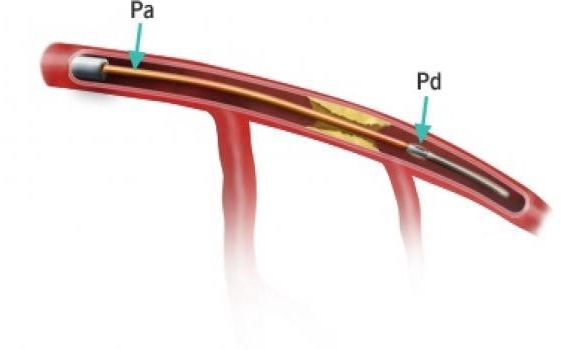Intracoronary Physiology FFR
Intracoronary Physiology FFR
- Fractional Flow Reserve (FFR) a golden technology is now frequently used to determine if a cardiac patient really needs a stent or bypass surgery or can be kept only on medicines avoiding any procedure.
- FFR is defined as the ratio between distal coronary pressure and aortic pressure, both measured simultaneously at maximal hyperemia.
- The difference in the pressure between these two points will give information on the severity of the block, and help to determine if the narrowing (block) needs to be cleared using procedures such as stenting, or whether it can be treated using only medicines.
- This scientific and evidence based procedure is beneficial to the patient as FFR technology not only saves lives while avoiding unnecessary surgery but also helps patients to save cost.

RADI ffr
- The measurement of Fractional Flow Reserve has been shown useful in assessing whether or not to perform angioplasty or stenting on “intermediate” blockages.
- The point of opening up narrowings or blockages in the coronary arteries is to increase blood flow to the heart.
- But a number of studies have shown that if a “functional measurement”, such as Fractional Flow Reserve, shows that the flow is not significantly obstructed, the blockage or lesion does not need to be revascularized (angioplasty) and the patient can be treated safely with medical therapy.
RADI ffr
Fractional Flow Reserve or FFR is expressed as a ratio or a fraction. During an FFR procedure, the cardiologist guides a pressure-sensitive wire into the arteries closest to the heart and measures the flow of blood, and its pressure.
FFR has been shown to correlate very well with non-invasive stress testing and is considered to be complementary to a conventional angiogram, particularly when the tightness of a blockage is difficult to establish by angiography or when patients have not had non-invasive stress testing. FFR technology saves lives while avoiding unnecessary surgery or stents ultimately saving costs.
Fractional flow reserve (FFR) is a technique used in coronary catheterization to measure pressure differences across coronary artery stenosis (narrowing, usually due to atherosclerosis) to determine the likelihood that the stenosis impedes oxygen delivery to the heart muscle (myocardial ischemia).
FFR is determined by a carefully calibrated sensor introduced into the blood vessel that measures the blood pressure upstream and downstream (before and after the block) after the administration of medicine like adenosine to induce maximum flow.
An FFR measurement indicates the severity of blood flow blockages in the coronary arteries and allows Cardiologists in Pune to identify which specific lesion or lesions (or blockage causing blood flow restriction) are responsible for a patient’s ischemia (a restriction of blood flow to the heart) and warrant stenting.
